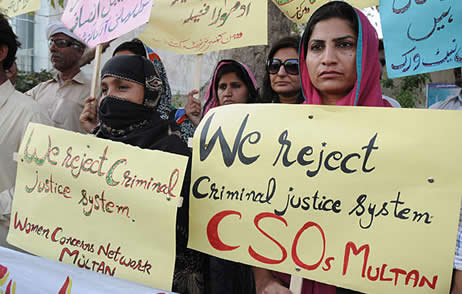For many, expressions of solidarity with Mukhtar Mai and calls for justice in her case were dismissed with the trendy oxymoron term “liberal fascism” and shameful accusations that the victim was somehow using her case to ‘get attention’. But it’s not just liberals who can see the painful injustice in this case. Even President JI Women’s Wing Samia Raheel Qazi termed the case as “unfortunate, cruel, and unjust” in a recent interview with Newsweek Pakistan. In the same interview, she complains that “Pakistan is a little too male dominated” and calls for greater education and freedom for women.
It might come as a surprise that a conservative Jamaati would be so outspoken against injustices faced by women, but it should not. Actually, a recent poll by Abu Dhabi Gallup Center found that only 40 per cent of women have confidence in the judiciary compared to 41 per cent who said they have no confidence.
What is the reason for this lack of confidence among women? Mukhtar Mai’s case may have received national attention, but there are countless other women whose abuses go unpunished across the nation. According to the Human Rights Commission of Pakistan 2010 report, the bulk of rapes were reported not in the tribal villages but in Punjab. Violence and inhumane treatment of our own mothers and sisters has been on the rise across the country.
Last March, President Zardari signed the Protection Against Harassment of Women at Workplace Bill, and just a days ago he signed a draft law to expand political and legal rights to FATA that will help improve access to justice for women in the tribal areas. This year we also saw women parliamentarians crossing party lines and uniting to pass the Criminal Law (Amendment) Bill 2011, formerly known as the Acid Control and Acid Crime Bill 2010. These are all positive steps, but we must do more.
While political leaders should continue fighting to protect women’s rights in the National Assembly, this does not mean that we do not have our own role to play. Here, I am speaking specifically to my fellow men who must do more to speak out against the treatment of our sisters. It is a promising sign of progress that women leaders are willing to cross party lines and stand up for the basic human rights of Pakistani women. It will be a day of rejoicing when men find the courage to do the same.
![]()






